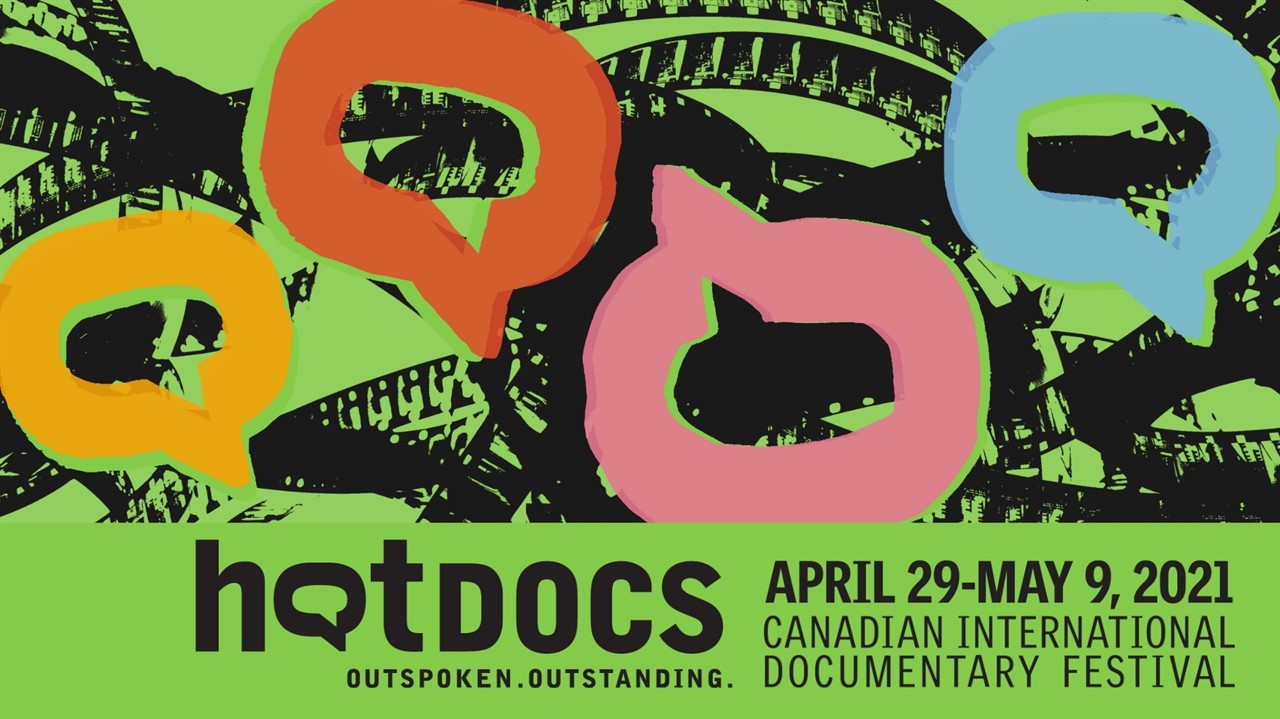|
|
||
|
Pro Tools
FILMFESTIVALS | 24/7 world wide coverageWelcome ! Enjoy the best of both worlds: Film & Festival News, exploring the best of the film festivals community. Launched in 1995, relentlessly connecting films to festivals, documenting and promoting festivals worldwide. Working on an upgrade soon. For collaboration, editorial contributions, or publicity, please send us an email here. User login |
Hot Docs 2021, Toronto, Context and Productions
Hot Docs (HD) is the largest documentary festival in North America and responded to the pandemic like other prominent international film festivals such as Berlinale and Sundance which set the stage for an effective transition to an online virtual festival. HD screened in 2020 more than 135 films, drawing more viewers from Ontario, participants to its professional market, and a growing subscription audience. The expectations for 2021 by the organizers were met. In its 28th edition, presented from April 29 to May 9, 222 films from 66 countries were streamed over 11 days, accessible to online subscribers throughout Canada. These subscribers continue using Hot Docs' streaming platform year-round and stay engaged after the festival ends. To date there are more than 8,000 subscribers paying $5.00 CAD a month to access the HD films and services. This year the programs included a live Q&A for the opening production A.rtificial I.mmortality, 129 prerecorded sessions with filmmakers, and several Curious Minds events focusing on film topics. Over $244,000 CAD was awarded in cash and prize funds. In the festival’s Docs for Schools program five festival documentaries were offered at no charge to 126 schools in Ontario and other provinces Before the festival. Hot Docs Independent Cinema Relief Fund was established for relief to independent cinemas, raising $79,000 CAD from the festival audience. This year’s edition could be streamed throughout Canada whereas in 2020 it could only be streamed by viewers from Ontario. The 2021 Hot Docs expansion to nationwide digital programming has enlarged its subscriber base and fostered audience engagement. The success of Hot Docs mirrors the impact of streaming platforms, the growth of documentaries funded by the platforms, changing audience habits towards at home virtual cinema, and relatively inexpensive large high-tech flat screen TVs, to name but a few factors. Further the “stigma” that feature documentaries are somehow elitist, boring, and not entertaining has faded. To be entertained by a documentary has become accepted. The commissioning editor for BBC Many Change has also suggested that the decline of investigative newspaper reporting creates space for investigative documentaries. The growing number of established and newly created streaming platforms have expanded funding opportunities for documentary filmmakers. The success of Berlinale’s European Film Market early this year and the two day Hot Doc Forum event presenting pitched productions, one-to-one sales meetings. and deal making sessions, set the parameter for the streamers’ relative domination of the market and the internationalizing of streaming documentary features. The Hot Docs Forum was attended by 3,377 registered delegates, including 214 decision makers, from 86 countries, compared to 1,535 who signed up last year. For five years, Netflix has been a presenting partner for HD, a role that Netflix now has in most major film festivals. Hot Docs has been innovative in establishing close working and financial relationships early on with Netflix and essential Canadian streaming platforms, coalitions which benefit all partiers covering sponsorships, training programs and productions. What also accounts for the success of Hot Docs is that the festival’s activities and data are transparent, and information is provided readily. Some other festivals seem to have a difficult time dealing with the press and refuse to provide information. Lack of transparency makes achievemenyts more difficult. The other problems are that film festivals relying on support from corporations selling upscale consumer products, income from non-media corporations like airlines, grants by public funding agencies and foundations, theater rentals, and membership fees will have a hard time surviving.
A.RTIFICAL I.MMORTALITY , Canada, Ann Shin, 2021 As science advances more rapidly the expectations of what it can do for humanity is expanding as well. Yet at the same time, control over the consequences of this development seems to elude mankind. There is a steadily growing gap between the current state of knowledge and the need for knowledge necessary to master what we now know. Put differently, the more we know the less we know or the greater the knowledge gap. Over the last decade, scientists have been able to join and grow living nerve and heart tissues in nanowire meshes, discovered the ability of cells to rewire their adaptive communication networks, and inserted stem cells in the embryos of monkeys just last year. Ann Shin’s 2021 Hot Doc’s opening film A.RTIFICIAL I.MMORTALITY (AI) sets a perfect frame for this knowledge dilemma. Covering the themes of artificial intelligence, the desire for immortality, digital replication of our selves through the growing creation of avatars, biomechanical robotics through human-machine mergers, and the ethical problems we face in applying and further developing the required digital technologies Ann Shin broadens the larger scientific and public debate on the myriad of challenges we face. Shin succeeds in raising ever more questions by interviewing experts in the field. Deepak Chopra is firmly committed to the “sunny side” of these developments. A few, like theorist Douglas Rushkoff, espouse doubts from a social science perspective about the basis of the optimism. Neuroscientists argue that the brain and its cognitive, emotional, and behavioral processes are too complex to ever be digitally emulated or re-constructed. These critics would dispute that consciousness can be transferred to a digital medium. There are small groups, lay and religious persons, who embrace the notion of creating mindfiles, digitizing their memories using whatever visual or oral records they have, and attempting to “clone” themselves in hopes of retaining part of themselves forever. Death would become optional because their digital self-constructs can live forever disconnected from the body and consciousness. Exhaustive constant data harvesting happens without an individual’s control and is most often surrendered to Amazon, Facebook, Google, and social media corporations for their own commercial purposes. They shape models of artificial general intelligences. There are also organizations like the Terasem Movement Foundation which, for a fee, can help the consumer create a mindfile as well as a biological one, freezing his or her cells for possible future revivification. There is also a transhumanism movement, which aims to overcome human limitations and relocate us outside ourselves, achieved by progressive digitization as the vehicle transcending death. From the discussion with Deepak Chopra and his avatar, Chopra’s recreation in the human form, subsequent encounters with Ann Shin’s avatar, her children’s session with her avatar, and exposure to other “speaking” mobile robots, it is readily evident that humankind’s trip into the personal identity emulation future is far from complete. Some fundamental limitations have not yet been overcome. An avatar can provide responses from massive digitals memory, and if prompted initiate actions from his programmed reactions. The avatar cannot spontaneously create actions because there is no ego nor motivation stemming from the subconsciousness because the avatar does not have them. Thus far, an avatar cannot create an identity but only can replicate one as programmed. Avatars cannot engage in communication beyond the programmed stimulus response or reaction process. This suspends basic human communication. In this complicated process, new knowledge and insights are negotiated and generated by exchanging and responding to fragments of meaning. The process of reflection or reflective responses is severely restrained, with the avatar remaining incapable of independent thought or the shaping of memory. All our minds and personal social universes set the parameters for constant reorganization of our memory by adding or deleting sections. In that sense, Ann Shin’s skepticism about the digital immortality project, despite rapid scientific advances, is well founded.
World premiering at Hot Docs BANK JOB (2021) by Daniel Edelstyn and Hilary Powell is a superbly constructed and enlightening documentation of the profit generating role of debt in our post-industrial Western societies. The discrepancies between social classes have grown dramatically, specifically during corona virus pandemic, with the underclass and large segments of the middle class holding fewer properties in 2021 but owing large amounts of money for educational, health, and all types of survival loans such as borrowing against anticipated income or covering overdue rent to avoid eviction. The filmmakers show how the accumulation of debt creates money and how this accumulation is fundamental for generating economic growth and impoverishing the people. Corporations with a “zombie status” have no income but survive by getting more loans to pay the interest on old ones, impoverishing the shareholders when they eventually go out of business. The action for BANK JOB is set in London. A group of community-based individuals set up their own bank with an office, furnishing it, and printing their banknotes in different denominations without breaking any regulations. The operation continued over two years and they sold their currency reaching an income of 40,000 pounds. Half of it is donated to neighborhood groups, local food pantries, youth clubs, and local schools whose revenues had been cut by the government. The other half was used, according to the filmmaker Hilary Powell, to “buy up and abolish 1.2 million pounds of local high interest debt. Debt gets sold for a fraction of its face value when debtors fail to make repayments. Debts get sold on and on – but debtors get chased for the full amount”l BANK JOB reveals and disturbs. The large number of volunteers involved in setting up this operation had to learn the needed business skills. Many had been legally victimized by speculators holding their debt notes with some losing homes because they could not pay the full amount owed. In the United States and probably Britain the little protection debtors had in the past has been further reduced by legally restricting recourse. After all, the banking and debt industries are among the most powerful lobbies
DEAD MAN’S SWITCH: a Crypto Mystery by Sheona McDonald, 2020, is a documentary embedded in a thriller format. It is a counter part to the BANK JOB because it reconstructs how hundreds of people lost their investments totaling between $215 and $260 million by placing them into the biggest Canadian bitcoin exchange, QuadrigaCX, run by Gerald Cotton, a persuasive but otherwise unknown individual. After the 2008 crash, a new period of financial trading with virtual money emerged, cryptocurrencies. BANK JOB focuses on the attempt to provide financial support to small public institutions, individuals, and families who were bankrupted by mounting debts as facilitated in our systemic turbo-capitalist society. DAD MAN’S SWITCH tries to explain how a massive fraud was carried out by one young man “serving” many individuals driven by greed to make huge and fast returns on their investments. They were blinded to the risk of fast money, though many of them were educated individuals, some having a financial background. Gerald Cotton died at the age of 30 under mysterious circumstances and doubts persist about his death. An investigation by the UK and some foreign agencies revealed that Cotton and his principal collaborators had been involved in scams and Ponzi schemes for years, that the last will drawn up before he died left his estate to his wife, that no records were available to track the destination of the deposited funds, and that Cotton did not leave the customary Dead Man’s Switch behind permitting access to the sophisticated encrypted codes guarding the deposits. Most of the funds are in cyberspace far exceeding the costs of Cotton’s luxurious lifestyle. His wife was stripped of her assets.
In the Canadian French 2021 co-production THE GIG IS UP by Shannon Walsh, the rapid advancement of technologies such as instant data analysis and the applications of algorithms replicating scientific analysis of productivity are scrutinized. These technologies have become essential in the progressive fragmentation of the labor market. Whereas these technologies also enabled the dreams of artificial general intelligence and overcoming death or fostering fast wealth by investing in crypto currency platforms, THE GIG IS UP investigates the creation of a new underclass who have been forced to work in the gig economy without the traditional protections many had before as full time workers. Once upon a time, workers had the benefits of health insurance, retirement funding, and sick days. They are now self-employed, often on a seasonal basis, getting their jobs through online platforms working for companies like Uber or Lyft as drivers, or in the mushrooming food delivery business. There has been a tremendous growth of this work force in North America and Western Europe but as Walsh shows, also in African countries. According to Jessica Kiang, Amazon pays their occasional workers with Amazon money through Amazon gift cards. Walsh gives a human face to these developments by interviewing the gig workers about work conditions they face over which they have no control and interviewing labor experts. There are no unions or governmental agencies protecting gig workers. Frequently paid a minimal compensation, their performance is measured continuously, and they can be laid of instantaneously and lose their only income. They have no protection against exploitation. They frequently come from groups in society at the lower margins, individuals who have lost their jobs, others who are underemployed and need more income to support their families, immigrants without work permits, and young people without marketable skills other than a driver’s license for cars or motorbikes or the ability to ride a bicycle. There is the initial illusion of being one’s own boss, but gig workers are in exist in slave-like dependency. Some changes are shown by Walsh, like a modicum of getting organized. The failure of politicians to intervene and protect those in need of a steady income and cover the costs of unemployment specifically in the pandemic period has allowed gig companies to grow rapidly and undercut serious attempts at reform. Their credo is to generate the biggest profits possible for managers and shareholders. A telling example is the destruction of the New York City taxi industry by the Uber driving platform even before the corona virus dominated the city. Politicians started expressing concerns here after many cab drivers committed suicide but did not engage in any corrective actions. They just talked.
New York, Claus Mueller filmexchange@gmail.com
27.05.2021 | Claus Mueller's blog Cat. : . Ann Shin avatar Bank Job Crypto Mystery fragmentation of the labor market greed Hot Docs C2=21 Context Immortality Losing all benefits Algorithms and employment neurology Overcoming Debt Sheona McDonald The Gig is Up FESTIVALS
|
LinksThe Bulletin Board > The Bulletin Board Blog Following News Interview with EFM (Berlin) Director
Interview with IFTA Chairman (AFM)
Interview with Cannes Marche du Film Director
Filmfestivals.com dailies live coverage from > Live from India
Useful links for the indies: > Big files transfer
+ SUBSCRIBE to the weekly Newsletter Deals+ Special offers and discounts from filmfestivals.com Selected fun offers
> Bonus Casino
About Claus MuellerThe EditorUser contributions |




























